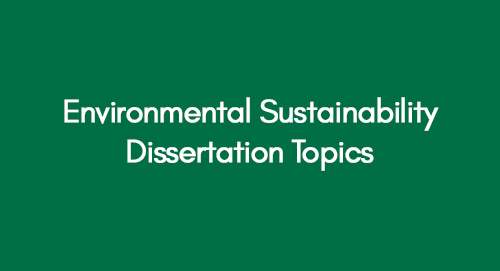Topic 21: Examining the Impact of Technology Innovation and Environmental Sustainability Practices on SME’s Performance in Developing Countries
Research Aim: The study examines the relationship between technology innovation and environmental sustainability practices on the performance of SMEs in a developing country. The research assesses how sustainable development measures can harbour economic growth without the depletion of natural resources. The research uses a quantitative methodology for data collection and analysis.
Topic 22: Tracking of Environmental Impact Caused by the Emissions from Aircraft and Other Aviation Machines
Research Aim: This research aims to monitor the impact of aircraft, helicopters, and other aerial vehicles on the environment. The research explores the carbon emissions, environmental impacts and sustainability issues of aviation emissions. The research carries out a quantitative study of the carbon emission per litre of fuel from different aircraft. An estimate of carbon and other greenhouse gases is made by analysing the fuel consumed.
Topic 23: An Assessment for the Water-Saving Technologies and Operational Sops for London Municipal Usage
Research Aim: this research aims to assess water-saving technologies and their implementation. The research makes a feasibility analysis for the implementation of water-saving technologies. The study ]also analyses the operational SOPs and identifies the areas of improvement for saving water. The study is conducted in two phases; analysis and assessment: phase and feasibility phase.
Topic 24: A Study on Urban Foresting to Reduce the Impact of Carbon House Gases and Maintain a Sustainable Environment
Research Aim: This study aims to analyse the importance of urban foresting to reduce carbon dioxide emissions due to excessive transportation and industrial activities. The study compares two cities of similar sizes, one with an urban forest and the other without urban forestation. The air quality index, carbon emissions and other parameters are monitored for three months, and findings are plotted to generate insights.
Topic 25: An Analysis of How Carbon Literacy Can Help Reduce the Carbon Footprint of Disadvantaged Households
Research Aim: This study aims to measure the carbon footprints of low-income households and identify the waste of carbon credits at home. Household carbon emissions are one of the major sources of carbon pollution and are often missed in the research. This thesis aims to identify the potential usage of carbon at homes and the impact of carbon literacy on two different geographical locations.
Topic 26: A Detailed Analysis of the Carbon Footprint of Electric Vehicles and the Sustainability Impact of Low Carbon Footprints on the Environment
Research Aim: This explorative analysis aims to uncover the concealed carbon footprint of electric vehicles. An electric vehicle does not require fossil fuel but uses an electric source to charge batteries. The study analyses the carbon footprint per KWh consumed by the vehicle and trackback the total carbon footprint of the car from its assembly to charging.
Topic 27: The Impact of a Widespread Application of Solar Panels: Can World Become Sustainable by the Year 2050?
Research Aim: This research aims to analyse if, through the application of solar panels, the World could become Sustainable by the year 2050. This environmental sustainability thesis is extremely helpful for environment-friendly prospects.
Topic 28: Assessment of Alternative Food Networks for Sustainable Production of The Food Products
Research Aim: The aim of this research is to identify the food production sources adding greenhouse gasses at an unprecedented rate as compared to the regular production sources. The study aims to propose food production sources that are more sustainable and less dependent on flood irrigation. The research aims to reduce water wastage, fertilizer supplementation and pesticide usage.
Topic 29: The Impact of Glacier Meltdown on The Aquatic Life Across the Arctic Region and The Warm Water Species
Research Aim: this research aims to identify the impact and adversaries of global warming on aquatic life. The study analyses the melting rate of the arctic glaciers and notes the rising temperature, sea level and current changes. The research also aims to identify the potential risk to aquatic life due to rising sea levels and temperatures.
Topic 30: Analysis of the Built Environment Sustainable Tool (BEST) Sustainability Assessment Tool
Research Aim: The study aims to analyze how the modern sustainability assessment tool, named BEST, which considers the environmental and economic and social aspects, is impacting new development projects.
This study is completed through a questionnaire distributed to the construction industry's practitioners.
Topic 31: Building an Economically Viable and Completely Sustainable World – A Review of Recent Trends and an Assessment of a Possible Future
Research Aim: This study aims to analyze worldwide economic and sustainability-based trends and their influence on the overall world environment, including economic and ecological health. The study further aims to explore the potential impact of using integrated sustainability metrics that can deliver revolutionary results in the economic and ecological health of the world.
Topic 32: New Approaches to Applying GIS (Geographical Information System) in the Field of Environmental Health Sciences
Research Aim: This environmental health dissertation topic analyses how integrated health-related data in a unified data system can be used to enhance environmental health.
Topic 33: The Application of Optimized and Economically Viable Green Technology in the U.K and its Impact on Environmental Sustainability
Research Aim: The research focuses on how consumers and manufacturers can encourage the development as well as the adoption of green technologies. This environmental economics dissertation topic aims to assess the increasing environmental awareness in the community regarding the adaption of green technology and sustainability-based products, and how it is influencing the economics of the companies associated with this field.
Topic 34: Modelling and Simulation of Sewage Wastewater Treatment Plants
Research Aim: This review paper focuses on wastewater treatment plant’s modelling (WWTP). Why white-box modelling is frequently used in this domain, with key applications including design, learning, and process optimization. This report presents the currently most used models of the white box for the analysis of biological sludge mechanisms and the removal of phosphorus.
Topic 35: Environmental Air Pollutants and Acute Lower Respiratory Infections: Comprehensive Analysis and Assessment of Worldwide Disease Burdens
Research Aim: This research focuses on the implications and reasons why young children around the globe have been exposed to acute lower respiratory infections (ALRI).
Topic 36: Health-Based Economic Evaluation on the Particulate Air Pollution in Urban Areas – A Case Study Shanghai, China
Research Aim: This paper analyses the key factors influencing the air quality in Shanghai. Quantitative research on the impact of particulate air pollution on Shanghai's economy and human health is aimed to be conducted during this study.
Topic 37: An Analysis of How Air Pollution and Climate Change is Impacting the Tourism Industry - A Case of the U.K (any country can be selected)
Research Aim: The purpose of the study is to investigate the long-term and causal links between climate change (i.e., greenhouse gas emissions, Sulphur hexafluorides and hydrofluorocarbons), air pollution (i.e., carbon dioxide and methane emissions) and development indicators of tourism (i.e., international tourism receipts and expenditures) as well as the impact and expansion of tourist activities on the environment.
Topic 38: Luxury Fashion Brand Management through the Application of Sustainable Fashion Themes and Storytelling
Research Aim: Sustainable fashion is an alternative trend against fast fashion. This research aims to analyse if the luxury brands in the fashion industry can apply Sustainable fashion trends with a focus on nurturing the reduction of pollution, innovative behaviour and achieving ethical/responsible production.
Topic 39: Analysing Dynamics of the UK’s pharma Industry in Producing Sustainable Business Models
Research Aim: The study aims to propose and develop a sustainable business model approach using tools such as business model canvas and system dynamics modelling. The study examines the sustainability-oriented business model designs in the current Pharmaceutical industry.
The research looks to incorporate industry perspectives to develop a more adaptable business model for sustainability. The study uses qualitative research methods to go about conducting the study.
Topic 40: Examining the Factors that Impact Sustainable Design for the Elderly
Research Aim: The study presents casual evidence on the factors that impact sustainable design choices for the elderly. The research analyses variables – design for all, universal design, and inclusive design when assessing planning the environment. The research looks to assess the planning taking place for sustainable ageing. The study takes a qualitative approach to methodology. This includes using semi-structured interviews with sustainable design industry specialists. Data is analysed using text analysis with the Nvivo tool.
Topic 41: Analysing the Role and Impact of Structural Design on Green Building Rating Systems: An Industry Perspective and Comparison of Life Cycle Energy Considerations with the Vicinity of Peterborough
Research Aim: The primary aim of this research is to analyse the role and impact of structural design on green building rating systems. The study further aims to present an industry perspective and a comparison of life cycle energy considerations within the vicinity of Peterborough (any region can be selected)
Topic 42: Analysing the Relationship Between the Organisational Sustainability Reputation and Consumer Behaviour - The Case of Peterborough?
Research Aim: This research aims to analyse the relationship between the organisational sustainability reputation and consumer behaviour - Peterborough, UK, has been selected as a case study to complete this research (any region can be selected).
Topic 43: Analysing How Optimising Sustainable and Strategic Management SOPs Leads to Business Success in the Corporate Sector - Evidence from the UK with Leadership in Sustainability as Mediating Factor of Analysis
Research Aim: The proposed topic aims to conduct an analysis of how optimizing sustainable and strategic management of standard operational practices leads to business success in the corporate sector. Primary data will be collected from the UK with leadership in sustainability as mediating factor of analysis.
Topic 44: Analysing the Impact of Global Governance on Achieving Sustainable Development Goals
Research Aim: This research aims to analyse the impact of having quality global governing structures on achieving sustainable development goals.































